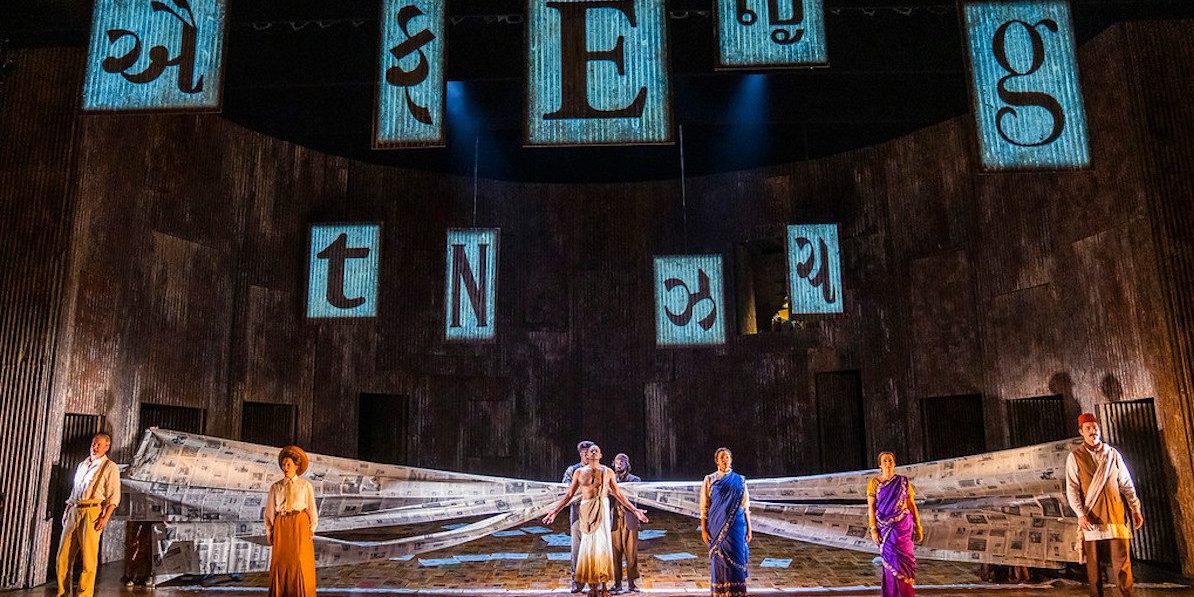Philip Glass’s music can be a marvellous tonic.
English National Opera 2007 production of Philip Glass’s Satyagraha was first staged at the London Coliseum in 2007 and enjoyed successful revivals in 2010 and 2013 and now 2021.
Fourteen years on, Phelim McDermott‘s acclaimed dramatization, in collaboration with the theatre company Improbable, offers a stimulating and engaging evening. The night I attended; the auditorium was almost packed with a young and not so young audience and the final standing ovations remind us of the joy of live performance after18 months of COVID-19 restrictions.
Glass has composed over 25 operas. He is best known for his ‘Portrait’ operas, the trilogy that includes Einstein on the Beach, Satyagraha written in 1979 and premiered in 1980, and the most popular of the three is the sumptuous production of Akhenaten.
Glass eschews the formula that runs through classic operatic devices and introduces short repeated musical phrases. These repeated phrases are given very fine variations that vibrate in various colours played by the orchestra comprising only of strings and woodwind (there are no percussion, horns, or brass).
The word Satyagraha, derived from the Hindu ancient poem Bhagavad Gita, was thought up by Gandhi to depict his philosophy of peaceful resistance. Glass’s music superbly retains the core of the philosophy throughout the opera. The vocal text, of what is known as a libretto, by Constance de Jong and Philip Glass, is an adaption from the Bhagavad Gita. The scripture is in the ancient Hindu language, Sanskrit. True to the text and subject, it is sung in Sanskrit. No surtitles are offered, and none are needed. The full drama unfolds via instrumental and vocal music.
There is no glitter in Satyagraha. It is an epic story of the life of Mahatma Gandhi. The sub-text is a political struggle. The focus is on his early years in South Africa and his approach to non-violent protest. It is an account of years of toil, rejections, and dogged persistence to pursue convictions through peaceful struggle. It is best described as an inspired meditation on the life of Gandhi through compelling visual and musical images.
True to Eastern philosophy that “The Past Time is the Present Time, as also the Future, which, though it has not come into existence, still is” past, present, and future are fused together and the narrative moves backwards and forwards through time and space. Three kindred spirits – Tolstoy, Rabindranath Tagore, and Martin Luther King – are inaudible observers of Gandhi’s journey. Against the backdrop of these silent figures, the powerful music transports the audience from what seems like a mantra to what can feel like an oncoming storm.
Phelim McDermott’s staging, together with the theatre company Improbable, created the physical bubble in which the music and the drama are bedfellows in generating an astonishingly creative platform for an unfolding meditation on Gandhi’s life.
Set design by Julian Crouch together with the creative team not only brought forth impressive gods but convincingly presented a reality that echoes the deprivation by using sheets of corrugated iron. The vast quantity of newsprint provokes a strong sense of the power embedded in the freedom of the press.
There is nothing minimalist about the length of the three-hour opera of three acts and seven scenes. However, there is minimalism in the structure and format of the work.
An outstanding, vocally perfect central performance is delivered by the tenor Sean Panikkar, Gandhi. He carries that role with an engaging voice, which is both rich and firm. The powerful singing of the bass-baritone Musa Ngqungwana as Lord Krishna, and the young newcomer, the bass singer William Thomas as Parsi Rustomji, are also commendable.
Under the skilful baton of the accomplished Chinese American conductor, Carolyn Kuan, the repeating musical phrases gradually morph into a moving harmony which produces not only drama but also suspend moments in time, capturing the varying moods of Gandhi’s long struggle, where time moves on while fundamental changes crawl behind. The orchestra at no point drowns any of the nine solo voices or the chorus. Vocalists are given their space and place.
It is a musical feast that superbly utilises the basic ingredients of this magisterial opera.

